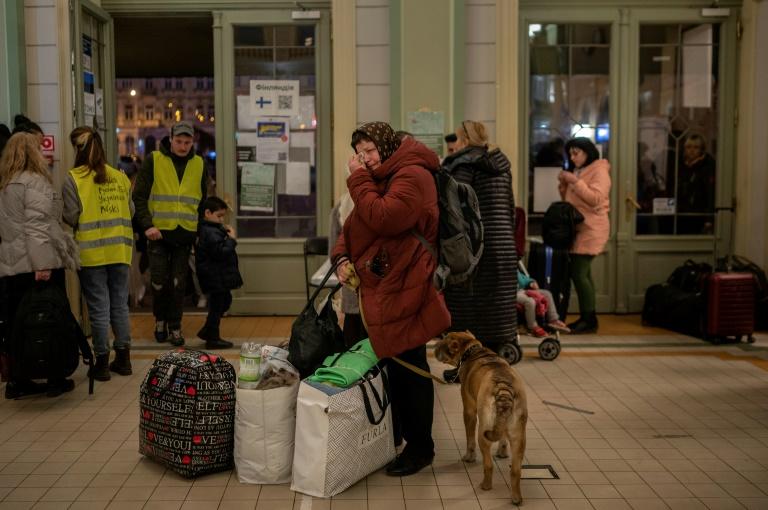
More than 3.9 million Ukrainians have now fled Russia’s invasion of their country, the United Nations announced Tuesday, with the Red Cross saying refugees were arriving exhausted and feeling “hopeless”.
UNHCR, the UN refugee agency, said 3,901,713 Ukrainians had fled the country — a figure up 38,916 from Monday’s update.
The daily flow of refugees has slowed to around 40,000 in recent days.
But the exodus “is unprecedented since World War II in Europe, certainly in terms of the speed and scale of the displacement,” UNHCR spokesman Matthew Saltmarsh told reporters in Geneva.
Francesco Rocca, the president of the International Federation of Red Cross and Red Crescent Societies (IFRC), added: “We are seeing millions of people arriving at borders, their coping capacities stretched by what they have experienced and witnessed.
“People are understandably tired and stressed, physically, mentally and emotionally,” he said.
The UN’s International Organization for Migration said that in addition to Ukrainian refugees, close to 200,000 non-Ukrainians living, studying and working in the country have fled.
And as of March 16, some 6.48 million people were estimated to be internally displaced within Ukraine, according to an IOM representative survey.
Before Russia’s February 24 invasion, Ukraine had a population of 37 million in the regions under government control, excluding Russia-annexed Crimea and the pro-Russian separatist regions in the east.
Here is a breakdown of how many Ukrainian refugees have fled to neighbouring countries, according to UNHCR:
– Poland –
Six out of 10 Ukrainian refugees — 2,314,623 so far — have crossed into Poland, according to UNHCR.
Many people who cross into Ukraine’s immediate western neighbours travel onto other states in Europe’s Schengen open-borders zone.
– Romania –
The number of Ukrainians who have entered EU member state Romania has now topped 600,000.
These 602,461 Ukrainians include a large number who crossed over from Moldova, wedged between Romania and Ukraine.
The vast majority are thought to have gone on to other countries.
IFRC president Rocca visited Romania last week.
“Romanian Red Cross teams have been working 24/7 at border crossings since day one, showing great empathy and humanity, providing basic items as well as SIM cards and mobile charging stations to help people,” he said Tuesday.
“Many who have crossed the border simply ask for a cup of coffee or tea. Seemingly simple aid like this can offer families peace of mind in an otherwise hopeless moment.”
– Moldova –
The Moldovan border is the nearest to the major port city of Odessa.
UNHCR said 385,222 Ukrainians had crossed into the non-EU state, one of the poorest in Europe.
To reduce congestion, organised convoys leave daily from the Palanca crossing for Romania, with the most vulnerable prioritised for transfer.
– Hungary –
Some 359,197 Ukrainians have entered Hungary, according to UNHCR.
– Slovakia –
Some 278,238 people have crossed Ukraine’s shortest border into Slovakia.
– Russia –
Some 271,254 refugees have sought shelter in Russia, according to UNHCR figures last updated on March 22.
In addition, 113,000 people crossed into Russia from the separatist-held pro-Russian regions of Donetsk and Lugansk in eastern Ukraine between February 21 and 23.
UNHCR spokesman Saltmarsh said Tuesday the agency was aware of recent allegations of forced movements of people from Ukraine to Russia but could not corroborate such information.
– Belarus –
Some 9,875 refugees have made it north to Russia’s close ally Belarus.
rjm/nl/jm




